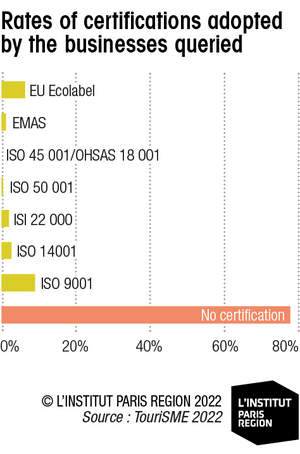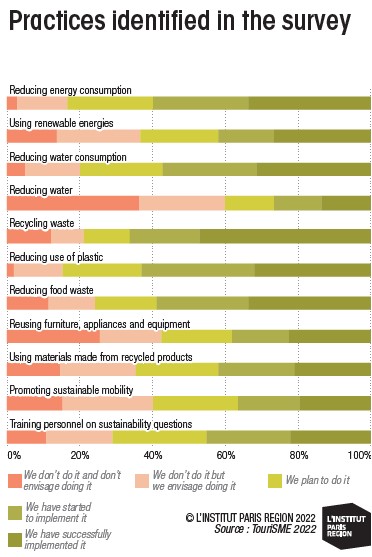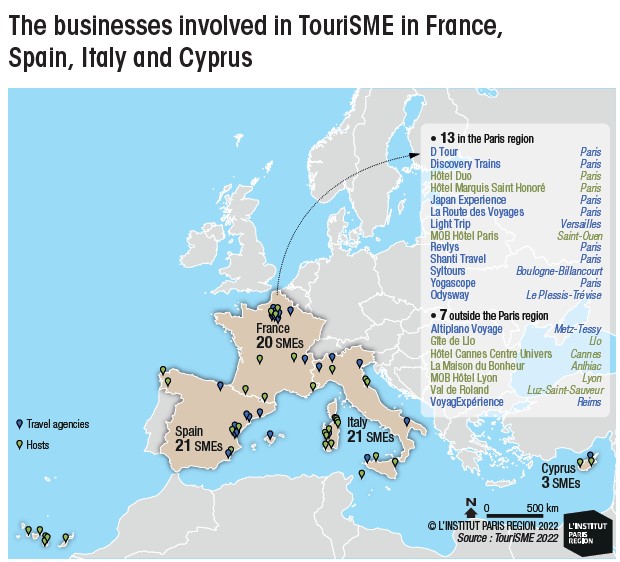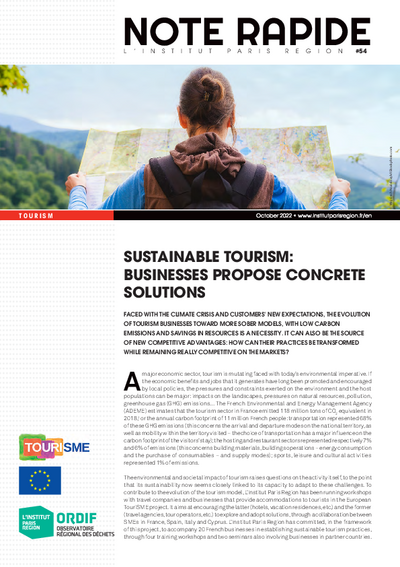Sustainable tourism: businesses propose concrete solutions
Faced with the climate crisis and customers' new expectations, the evolution of tourism businesses toward more sober models, with low carbon emissions and savings in resources is a necessity. It can also be the source of new competitive advantages: how can their practices be transformed while remaining really competitive on the markets?
A major economic sector, tourism is mutating faced with today’s environmental imperative. If the economic benefits and jobs that it generates have long been promoted and encouraged by local policies, the pressures and constraints exerted on the environment and the host populations can be major: impacts on the landscapes, pressures on natural resources, pollution, greenhouse gas (GHG) emissions… The French Environmental and Energy Management Agency (ADEME) estimates that the tourism sector in France emitted 118 million tons of CO2 equivalent in 2018, or the annual carbon footprint of 11 million French people: transportation represented 68% of these GHG emissions (this concerns the arrival and departure modes on the national territory, as well as mobility within the territory visited – the choice of transportation has a major influence on the carbon footprint of the visitors’ stay); the hosting and restaurant sectors represented respectively 7% and 6% of emissions (this concerns building materials, buildings operations – energy consumption and the purchase of consumables – and supply modes); sports, leisure and cultural activities represented 1% of emissions.
The environmental and societal impact of tourism raises questions on the activity itself, to the point that its sustainability now seems closely linked to its capacity to adapt to these challenges. To contribute to the evolution of the tourism model, L’Institut Paris Region has been running workshops with travel companies and businesses that provide accommodations to tourists in the European TouriSME project. It aims at encouraging the latter (hotels, vacation residences, etc.) and the former (travel agencies, tour operators, etc.) to explore and adopt solutions, through a collaboration between SMEs in France, Spain, Italy and Cyprus. L’Institut Paris Region has committed, in the framework of this project, to accompany 20 French businesses in establishing sustainable tourism practices, through four training workshops and two seminars also involving businesses in partner countries. Several fields have been investigated: energy savings, water management, waste management, the purchasing process, responsible consumption, mobility and the conception of trips. The businesses were selected after a call for applications published in the four partner countries in June 2021. Out of 158 SMEs that submitted applications, 65 were chosen.
STILL TIMID COMMITMENTS AND PRACTICES
When the TouriSME project started, the University of Pisa, which is one of its partners, conducted a survey from January to March 2021 with tourism SMEs located in the four countries, and then analyzed the 256 responses it obtained. The first observation was that 78% of the responding businesses had no certification at all. Only 9% and 27% of the SMEs respectively had an ISO 9001 and an ISO 14001 certificate. Moreover, scarcely more than 6% of them were certified by the European Ecolabel, this percentage dropped to 1.2% for the European Environment Management and Audit Scheme (EMAS; see graph below).
The SMEs explain this observation by indicating that the demand or expectations of partners, suppliers and professional associations concerning the adoption of an environmental certification or ecolabel in the tourism industry is still very low.
If we take an interest in the practices already implemented, the survey shows that most of the SMEs are focused on waste management. 47.3% of them already practice recycling, while 19.1% have started to implement it. As for energy consumption and food waste, 34% of the businesses have already reduced them. 32.4% and 31.6% of the SMEs have also successfully implemented measures aiming at reducing respectively the use of plastic and water consumption. The reuse of water shows, on the contrary, the lowest adoption rate. As for other practices, the overall adoption level is not high, notably that of promoting sustainable mobilities and even more so that of reusing water (see graph below).
CURBS ON THE ADOPTION OF GOOD PRACTICES
Feedback from French businesses involved in changing their practices makes it possible to identify a certain number of curbs on their adoption.
Thus, waste sorting is implemented by all of the SMEs queried, but seems improvable for some of them. If sorting bins are installed in the common areas of a hotel, it turns out that there is little followup of their correct use, in terms of the customers as well as the personnel. There is a real challenge on follow-up, awareness-raising and information in order to have businesses adopt this practice. Putting sorting recipients in each room also raises the question of their aesthetics and the space available for them. Lastly, in a more global manner, a reflection is to be carried out on the choice of collection and recycling service providers to ensure that their task is done in the best way possible. The time the hosts devote to the implementation of waste management in its totality (awareness-raising, signs, follow-up, choice of equipment and service providers, etc.) is a major obstacle.
As for energy saving and water consumption reduction on the scale of the building, apart from the cost that their implementation can involve (insulation work, renovation of the heating and air-conditioning system, etc.), the status of the owner-operator or the operator alone is impactful. Insulation and energy-saving work decreases the site user’s operating costs, but increases the owners’ investment expenditures, which will not result in immediate economic benefits, not being directly concerned by the energy savings generated.
THE COMMITMENT TO SUSTAINABLE TOURISM RAISES CONSTRAINTS
A national study, conducted in January 2022 by Tourisme Bretagne in partnership with ADN Tourisme and the National Union of Tourism Associations (UNAT) shows the growing interest of French people in more responsible tourism. Out of 5,000 vacationers queried, 70% envisage traveling in a more ecological manner. Among them, 66% have committed to respecting the natural environment in the areas they visit, 56% to buying local products, 53% to better managing their waste and lastly 50% to better choosing their accommodations. Moreover, a recent study by the Regional Tourism Committee (CRT) of Nouvelle-Aquitaine (sample of nearly 1,800 people) underlines the impact of the stay on the environment and on local life, and the commitments made by the destination on sustainable tourism have still not become the decisive criteria on the choice of a vacation place. The study brings out the following feelings: a higher price of services for 44% of the people queried, tourism that would be too constraining for 35%, a loss of comfort for 24%, a shortage of information and a lack of visibility of the offering for 24% and lastly messages that make the visitors feel guilty for 17%. Sustainable tourism gives the clientele an image of tourism that is expensive, sober and reasonable, whereas they wish to take advantage of their vacation, not be restricted and to leave behind their sometimes very constraining daily life. According to their perceptions, sustainable tourism will therefore run counter to their sought-after objectives. This difficulty is pushing the businesses to provide a positive and appealing discourse to make sustainable tourism more desirable. The promotion of the charms of the territories and their inhabitants or the preservation of patrimonial wealth and local biodiversity are put forward as rich experiences to take part in.
For a travel agency, this commitment to sustainable tourism involves renewing the initial offering and devoting time to identifying new services and service providers. The actors of businesses that host tourists also have many action levers that can however be a source of major financial investments when the question, for example, is one of upgrading the heating or air-conditioning system. Furthermore, the hotel owners’ desires for sobriety to limit, for example, welcome kits, the recipients of hygiene products, minibars in the rooms or digital tools are often poorly understood, and even more so in luxury hotels.
The time of accompaniment and awareness-raising is a parameter to take into consideration in the marketing of a trip or in a visitor’s welcome. It requires training efforts (acculturation on the environmental stakes), structuring of the offering (on which practices the business wants to position itself, in what order of priority, etc.) and the availability of the personnel to carry out this work.
A WINDOW OF OPPORTUNITY TO ACCELERATE THE MOVEMENT IN THE PARIS REGION
Whereas 2022 has marked a major renewal of tourism, and the Paris region is gradually recovering its place in the top 5 tourist destinations worldwide, this year is also one of awareness-raising on the challenges of climate change: repeated heat waves, droughts and wildfires in vacation destinations that have never had them before (in Brittany, notably)… In this context, an appealing and positive discourse on sustainable tourism, and especially an acceleration of eco-responsible tourism offerings with clienteles of the Paris region are essential. To succeed in this endeavor, it is important to accompany tourism businesses concerned about making their offerings evolve. The European TouriSME project has made it possible to identify nearly 70 good practices that are easy to appropriate and are directly accessible online in order to facilitate their dissemination (see Genially toolbox below). ■
This study is linked to the following themes :
International |
Economy |
Environment




